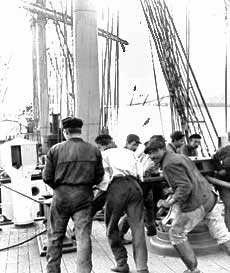Seminar: Seminar is a cornerstone of program work and a crucible for the life of our learning community. Traditionally, seminar is student centered and student led, but every seminar is different, and interpersonal dynamics have as much to do with a successful seminar as do preparedness and intellectual engagement in conversation. The faculty will determine seminar groups, and each group will spend time developing a seminar covenant and a variety of strategies for success.
Workshop: Workshop sessions will focus on specific skill areas and give students the opportunity to work independently and in groups on challenging tasks designed by the faculty.
Group Work: Group work will crop up in many areas of the program, particularly when you are working, eating, sleeping, and learning around the clock onboard the two tall ships. Effective group participation is considered a crucial aspect of your learning.
Writing: Academic writing tasks will be assigned as needed to support work in seminar and other aspects of the program. Each week you will be expected to write a thoughtful, short thesis-based essay in response that week's reading; you should bring a preliminary version of this paper to Wednesday morning seminar. On Friday you will submit both the preliminary draft and the final formal version. In addition, you will be required to create clear, tidy records of your piloting computations; a leadership journal while on the expedition; a thorough and accurate log of the day's work on the vessels when it is your day to do so; and a final integrative, descriptive analysis of your experience as a worker on the water, in class and in this learning community.
Exams: You will be required to pass two exams this quarter in order to receive full credit. The first will be a pre-vessel exam, which will demonstrate a basic understanding of the tall ships and how they work. The second will be a volunteer qualification evaluation, which will exemplify the sail training skills you will have learned throughout the quarter, and applied during your two weeks at sea. This second evaluation will determine your status as a future volunteer on the tall ships.
Program portfolio: A final portfolio (a big 3-ring binder) displaying your quarter's work is a requirement for credit. This portfolio will be a significant resource for your faculty in crafting your evaluation. Therefore, it should be well organized and reflect pride in your accomplishments. Don't throw anything away until the program is over.
Evaluations: Do not schedule travel for the end of the quarter until you have scheduled your evaluation conference. Failure to be present for your evaluation conference can result in a loss of credit..
